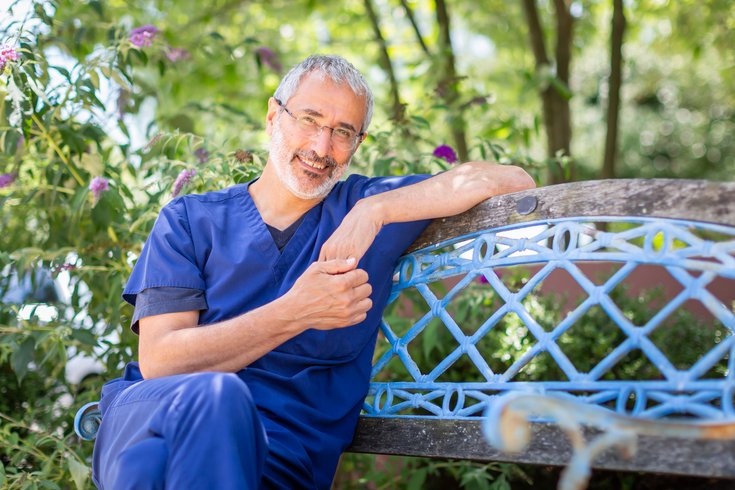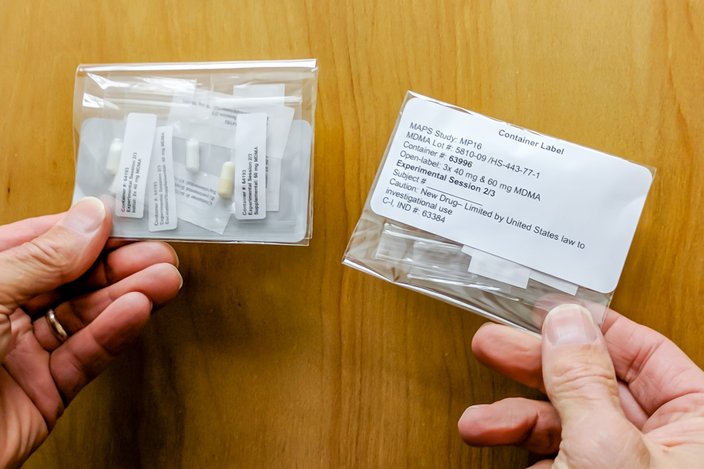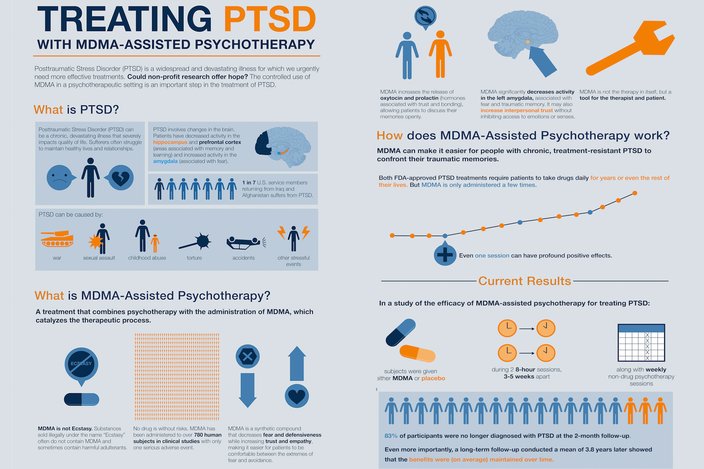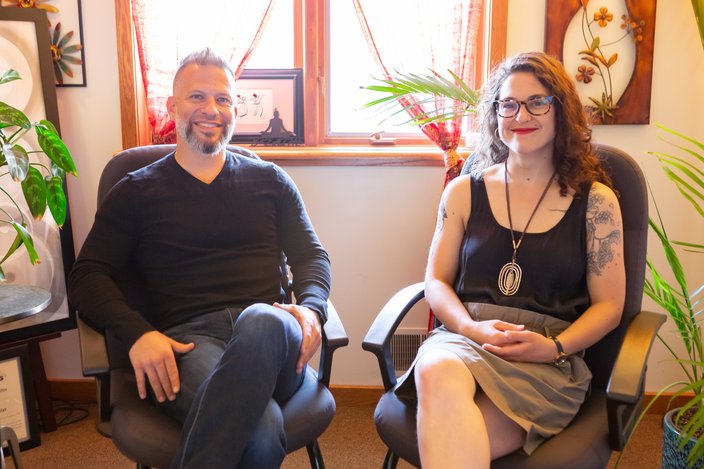
July 16, 2019
 Thom Carroll/PhillyVoice
Thom Carroll/PhillyVoice
Dr. Samy Badawy, seen outside his dermatology office in Wyndmoor, Montgomery County, is the founder of The Landing, a psychedelic-assisted psychotherapy center opening later this summer that will begin offering MDMA-assisted treatment of PTSD early next year. "People have had drastic changes after one round of this treatment," he said. "People have been able to normalize significant portions of their lives as a result of this."
A psychedelic drug holds so much potential to improve treatment of post-traumatic stress disorder that some Philadelphia-area patients may get it before the U.S. Food and Drug Administration gives formal approval.
Clinical trials for MDMA-assisted psychotherapy have shown enough promise for the FDA to consider expanded access to patients whose PTSD has proven resistant to current treatments currently, according to the Multidisciplinary Association for Psychedelic Studies, a California-based organization sponsoring the trials.
A new center for psychedelic-assisted psychotherapy – the first in the Philadelphia region – plans to open later this summer in Wyndmoor, Montgomery County, and begin offering MDMA-assisted psychotherapy early next year pending FDA approval. A second center, run by another provider and based in West Philadelphia, is expected to follow next spring.
MDMA is scientifically known as methyl enedioxy methamphetamine, a synthetic drug that decreases fear and defensiveness while boosting trust and empathy – capabilities that clinicians say enhance the effectiveness of psychotherapy.
But it remains classified as a Schedule I drug by the U.S. Drug Enforcement Administration, having gained a reputation in the 1980s as a party drug commonly sold as ecstasy or molly.
Clinicians stress that the MDMA being used medically differs from the street version, which is typically cut with dangerous contaminants. And it only is being used in controlled therapeutic settings; patients cannot take it home.
"The model is really how to get people off of the treatment as quickly as possible," said Brad Burge, MAPS' director of strategic communications. "The emphasis is on the psychotherapy, not on the drug."
While the drug does not treat PTSD on its own, it has shown incredible promise in clinical studies when coupled with psychotherapy.
MDMA-assisted therapy integrates controlled drug treatments into a psychotherapy course that extends several months. Delivered intermittently, the drug helps patients to work through harrowing experiences otherwise too painful to discuss, even with a professional therapist.
Previous clinical trials administered two or three MDMA treatments to 103 participants during a 12-week psychotherapy course. Just two months afterward, 54 percent no longer had enough symptoms to meet the standards of a PTSD diagnosis. At the 12-month mark, that figure had jumped to 68 percent. And virtually every patient saw his or her symptoms reduced.
"We weren't expecting that magnitude of results," Burge said. "We were expecting some benefits, but that's actually tremendous."
Those results prompted the FDA to label MDMA-assisted psychotherapy as a "breakthrough therapy," a designation given to treatments that demonstrate substantial improvement over existing therapies during preliminary clinical research.
The treatment's promise also prompted expansion of trials underway at 14 sites in the United States, Canada and Israel. If those ongoing trials confirm the previous efficacy and safety findings, the FDA could formally approve MDMA-assisted therapy by 2021. At that point, doctors would be able to prescribe the synthetic, psychoactive drug for use in a controlled therapeutic setting.
MDMA regulates the amygdala, opening up the psyche in a way that enables patients to examine difficult material without being triggered by it.
In the meantime, additional sites, including two in the Philly region, may soon begin offering MDMA-assisted psychotherapy as part of the FDA's expanded access protocols. The agency grants such access when there are not any comparable alternative therapies available to patients with serious or life-threatening conditions.
PTSD is considered life-threatening due to its strong association with depression and suicide, Burge said. Potential patients first must have tried other available treatments, which include medications and other forms of psychotherapy.
MAPS expects the FDA to grant approval for expanded access, Burge said. Negotiations on the protocols – which stipulate exactly how the expanded access sites must conduct the therapy – remain ongoing. But Burge said approval could be close.
FDA spokesperson Amanda Turney did not directly comment on the FDA's consideration of expanded access for MDMA-assisted therapy. But she said a patient seeking any treatment through expanded access must have their physician make a formal request to the FDA. The majority of requests are approved.
MAPS anticipates at least a dozen sites nationwide will provide expanded access to MDMA-assisted psychotherapy. That includes The Landing, a psychedelic-assisted psychotherapy center set to open in Wyndmoor, and the SoundMind Center, a West Philly site specifically hoping to reach marginalized communities.
MDMA will be used in conjunction with psychotherapy to help treatment-resistant PTSD patients.
About 7 or 8 percent of people will experience PTSD at some point in their lifetime, according to the National Center for PTSD. The disorder often develops in people who have experienced a scary, shocking or dangerous event, including military combat, natural disasters and sexual abuse. But other experiences – like the sudden loss of a loved one – also can prompt the disorder.
PTSD has different effects on different people, according to the National Institute of Mental Health. Some people recover within six months, while others develop chronic symptoms that persist for years. The clinical trials for MDMA-assisted psychotherapy included PTSD patients whose symptoms have persisted for more than a decade.
"It's all very new and I think it needs to be done in a careful and nuanced way," said Dr. Samy Badawy, founder of The Landing. "Reintroducing and reopening this door of working in expanded states – I think we have to be responsible and not really waste this opportunity to hold this work in a very careful and judicious way. This is not really about repeating the 1960s."
"It's challenging to treat. Having innovative and new treatment modalities is something that is needed ... for many things. But particularly for PTSD." – Dr. Daniel Monti, CEO, Jefferson Health's Marcus Institute of Integrative Health
During MDMA-assisted psychotherapy, PTSD patients have several standard psychotherapy sessions before their first treatment with the drug, which is administered in a 6-to-8 hour session monitored by a pair of therapists.
Several more standard psychotherapy sessions follow in the ensuing weeks before a second MDMA treatment. Then, the cycle repeats a third time.
Proponents say the MDMA treatments expand a therapeutic window that allows patients to confront the source of their PTSD in a way that standard psychotherapy does not permit.
"It's what makes PTSD therapy notoriously difficult and very, very, very slow," said Mark DiFilippo, a holistic psychotherapist at The Landing. "The window of where you can work with people around traumatic experiences and the symptoms ... is very small."
People with PTSD often have a hyperactive amygdala, a portion of the brain that helps regulates fear and anger, causing them to feel stressed or frightened even when danger is not present. As a result, therapy is difficult because patients are prone to so-called "fight or flight" responses.
But the MDMA regulates the amygdala, opening up the psyche in a way that enables patients to examine difficult material without being triggered by it.
"When they go into an experiential session with MDMA, it creates a lot of breadth for them to look at that experience from a number of different vantage points – to process it, to release it, and to no longer be limited or chained by it," Badawy said.
The drug also stimulates naturally-occurring hormones that increase feelings of trust and bonding, which may help some patients feel safer and more connected to their therapists.
.
Current drug treatments for PTSD typically begin with selective serotonin reuptake inhibitors (including Prozac, Paxil and Zoloft) – antidepressants that can help control stress-related symptoms like sadness, worry and anger. Other drugs might help with sleep problems or nightmares.
Cognitive behavioral therapy, including exposure therapy and cognitive restructuring, also have been found to relieve some symptoms.
But not everyone with PTSD responds to treatment in the same way. And some people don't respond at all to those conventional treatments.
"It's challenging to treat," said Dr. Daniel Monti, chief executive officer of Jefferson Health's Marcus Institute of Integrative Health. "Having innovative and new treatment modalities is something that is needed ... for many things. But particularly for PTSD."
Monti, who is not involved with MAPS or any of the Philly sites planning to begin MDMA-assisted psychotherapy, called research results promising, though he cautioned that such findings don't always hold true once clinical studies expand.
"Sometimes in early studies what seems to be like, 'Wow, this is going to be great,' tends to have a more dampened response later on," Monti said. "I certainly hope for all of the people with PTSD that this holds the efficacy that people are seeing in the (previous) study."
Monti sees real potential in MDMA-assisted psychotherapy, but he said it's unlikely to work for everyone with PTSD – just like antidepressants and cognitive behavioral therapy work for some, but not others.
"There isn't a perfect treatment," Monti said. "But this is often the case with every major mental health disorder out there."
Additionally, MDMA-assisted psychotherapy is not cheap.
Any site approved for expanded access will set its own price. Burge estimated the therapy could cost between $5,000 and $10,000, mostly because the psychotherapy sessions require two therapists for 12 sessions. By comparison, he said the drug itself – a capsule taken orally – is relatively cheap.
If the FDA eventually approves MDMA-assisted psychotherapy, MAPS will work to get insurance companies to cover the therapy, Burge said. Though pricey, it is believed that successful therapy will cost health insurers less money in the long run.
With the prohibitive cost in mind, a joint fundraiser will be hosted Wednesday by The Landing and The SoundMind Center to defray the cost of training therapists and develop a fund to support patients who would not be able to afford MDMA-assisted psychotherapy.
Holistic psychotherapists Mark DiFilippo, left, and Jess Jones will work as a team to treat PTSD with MDMA-assisted therapy at The Landing in Wyndmoor. “The window of where you can work with people around traumatic experiences and the symptoms ... is very small,” he said.
The Landing, which will have three physicians and six licensed therapists on staff, hopes to begin MDMA-assisted psychotherapy in early January.
It initially will provide ketamine-assisted psychotherapy to people with treatment-resistant depression when it first opens, likely in early September. The center also will provide Somatic Experiencing, Hakomi Method and various forms of traditional counseling.
Still, Badawy is particularly excited by the potential he sees in MDMA-assisted psychotherapy, pointing to the participants in earlier clinical trials who had suffered from PTSD for an average of 17.9 years.
"People have had drastic changes after one round of this treatment," Badawy said. "People have been able to normalize significant portions of their lives as a result of this."
Similarly, the SoundMind Center, founded by Dr. Hannah McLane, has assembled a diverse, six-person team dedicated to reaching marginalized populations that have higher rates of PTSD compared to the general population. Those groups include people of color, the LGBT community and cognitively-diverse people, like those with autism or dyslexia.
McLane, a physician and a psychotherapist, conducts research at the Philadelphia VA Medical Center that examines cognitive diversity, PTSD and alternative therapies for mental health issues.
She said people of color often face ongoing traumas caused by racial injustices and neighborhood violence – in addition to potentially having a main index trauma.
"This leads to higher rates of PTSD in communities of color and this can also be more difficult to treat due to the ongoing nature of it," McLane said in an email. "We want to make sure to put significant resources towards addressing this inequality, as higher rates of PTSD in the population can cause ripple effects that serve to worsen the already unequal and unjust system."
To reduce patient costs, McLane intends to operate with sliding scale fees and supplement revenue through fundraising and grant-writing.
"Having PTSD can often make it difficult for someone to hold a job, which causes lack of financial security, loss of health insurance and difficulty accessing care," McLane said. "These are all challenges we are working to address...."
Follow John & PhillyVoice on Twitter: @WriterJohnKopp | @thePhillyVoice
Like us on Facebook: PhillyVoice
Add John's RSS feed to your feed reader
Have a news tip? Let us know.
 Photo courtesy/Multidisciplinary Association for Psychedelic Studies
Photo courtesy/Multidisciplinary Association for Psychedelic Studies Graphic courtesy/Multidisciplinary Association for Psychedelic Studies
Graphic courtesy/Multidisciplinary Association for Psychedelic Studies Thom Carroll/PhillyVoice
Thom Carroll/PhillyVoice